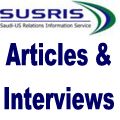Let's get to know the Saudis
Lee Hamilton
The U.S.-Saudi Arabian relationship has long been important,
sensitive and opaque. Over the last few months, it has also been
tested by a newly assertive Saudi Arabia.
A simple deal has driven U.S.-Saudi relations for decades: The
Saudis provide access to affordable oil; the United States
provides security for the Saudi royal family. Yet tensions
intrude upon this marriage of convenience. Americans have
questioned Saudi Arabia's autocratic government, opposition to
Israel and financial support for radical Islam. The Saudis have
chafed at our lectures on democracy, support for Israel and the
war in Iraq.
Lately, Saudi King Abdullah has shown a surprising willingness
to go his own way. The
Saudis brokered a cease-fire between Palestinian
factions that the U.S. saw as too favorable to Hamas, a group we
have targeted for isolation. King Abdullah in turn called for an
end to the isolation of Hamas. He also renewed a
2002 Saudi initiative for an Israeli-Palestinian peace based
on Arab recognition of Israel in return for a Palestinian state
based on Israel's 1967 borders.
King Abdullah has been even more direct in challenging the
United States.
Speaking to a conference of the Arab League, he declared:
"In the beloved Iraq, the bloodshed is continuing under an
illegal foreign occupation and detestable sectarianism." In the
Middle East, where opposition to America is at unprecedented
levels, these moves went over well.
The irony is that the United States has pressed the Saudis to be
more assertive. For months, Bush administration officials have
spoken of a realignment in the Middle East in which "moderate
Arab states" like Saudi Arabia worry more about a rising Iran
than Israel. Yet while the Saudis are very concerned about
Iran's growing influence and nuclear program,
King Abdullah has hosted talks with Iran's President Mahmoud
Ahmadinejad and spoken out against the prospect of a U.S. attack
on Iran.
The reality is that the Saudis see many things differently from
the Bush administration. They don't want the Palestinians to
descend into civil war, but they do see Hamas as a legitimate
player in Palestinian politics. They don't want us to pull out
of Iraq immediately, but they do want us to do more to protect
Sunni Arabs from Shiite militias. They don't want a nuclear Iran
next door, but they are open to engagement with Iran and groups
like Hezbollah. The Saudis want to maintain close ties with the
U.S. and certainly want our military presence to provide
stability in the region, but they also appear to be looking for
other ways to advance their interests.
In the United States, we should be doing our own re-evaluation.
We do have a significant interest in the stability of the Saudi
kingdom, principally because its oil is enormously important to
the health of our economy. But Saudi Arabia is not a moderate
Arab state -- it is an autocracy. While it has cooperated in the
war on terror, it denies its people political and economic
opportunity. It is no coincidence that 15 of the 19 hijackers on
9/11 were Saudis angry at their government, angry at the United
States and ensnared by radical Islam. Yet while we press the
Saudis to cooperate on counter-terrorism, we do not press them
to liberalize their political and economic system.
We should not push for dramatic and potentially destabilizing
change, nor should we reduce our commitment to the security of
Saudi Arabia. But we should press for pragmatic reform so that
the seeds of civil society, greater economic equality and
political participation have the opportunity to grow. We should
also pursue an energy policy that reduces our dependence on
foreign oil and gas. Here, too, we cannot expect miracles. But
we can move boldly in the direction of energy independence. Over
time, these threads can complement our commitment to stability
and lead to a more mature relationship.
At a time when America's standing in the Middle East is shaken,
it is not surprising that the Saudis are defining their
interests as they see them, not as we do. We should use this
occasion to better understand Saudi concerns, and to move toward
a relationship that is deeper and more sustainable than the
simple deal that has defined U.S.-Saudi relations all these
years.
About Lee Hamilton, President and Director, Woodrow Wilson
International Center for Scholars
What is the Woodrow Wilson International Center for Scholars?
The Center is the living, national memorial to President Wilson
established by Congress in 1968 and headquartered in Washington,
D.C. It is a nonpartisan institution, supported by public and
private funds, engaged in the study of national and world
affairs. The Center establishes and maintains a lively, neutral
forum for free and informed dialogue.




